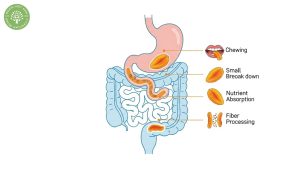Dried mango digestion can be both beneficial and challenging for your digestive system. While dried mangoes provide valuable dietary fiber that supports gut health, they can also cause bloating, gas, and discomfort when consumed in excess due to their concentrated sugar content and moisture-absorbing properties.
At Ogani VN, we understand that many of our customers enjoy dried mango as a healthy snack but want to know how it affects their digestive system. Let’s explore the complete picture of how dried mango digestion works and what you need to know.
How dried mango affects your digestive system

Dried mangoes impact your digestive tract in several distinct ways. The dehydration process concentrates both nutrients and natural sugars, creating a food that your body processes differently than fresh fruit.
When you consume dried mango, your digestive system must work harder to break down the concentrated sugars and fiber. The lack of water content means the fruit absorbs moisture from your digestive tract, which can lead to slower transit times and potential discomfort.
The fiber content in dried mango, typically 2-3 grams per serving, acts as a double-edged sword. While it supports healthy digestion by promoting regular bowel movements and feeding beneficial gut bacteria, excessive consumption can overwhelm your system, especially if you’re not accustomed to high-fiber foods.
Digestive benefits of dried mango
Fiber content and gut health support

Dried mango contains both soluble and insoluble fiber that provides significant digestive benefits. The soluble fiber helps slow sugar absorption and creates a feeling of fullness, while insoluble fiber adds bulk to stool and promotes regular bowel movements.
This combination supports your gut microbiome by providing prebiotic compounds that feed beneficial bacteria. Research suggests that the dietary fiber in mangoes can help stabilize your digestive system and improve overall gut health.
Amylase compounds for better digestion
Fresh and dried mangoes contain natural amylase compounds, which are digestive enzymes that help break down starches and carbohydrates. These enzymes can assist your body’s natural digestive processes, making it easier to process complex carbohydrates from other foods consumed alongside dried mango.
The presence of these compounds makes dried mango particularly beneficial when eaten as part of a balanced meal, as they can enhance your body’s ability to digest other foods effectively.
Potential digestive concerns with dried mango
Bloating and gas production
Many people experience digestive discomfort after consuming dried mango, particularly bloating and gas. This occurs because the concentrated sugars and fiber can ferment in your large intestine, producing gases that cause abdominal distension.
The sulfur compounds naturally present in mangoes can also contribute to gas production. Additionally, if dried mango contains added sulfites as preservatives, these can trigger digestive sensitivity in some individuals.
Sugar concentration effects
The dehydration process concentrates natural fruit sugars, creating a product that’s significantly higher in sugar per serving than fresh mango. This concentrated sugar content can cause rapid blood sugar spikes and may lead to digestive upset, especially in people with sensitive stomachs or diabetes.
When consumed in large quantities, these concentrated sugars can also have a laxative effect, potentially causing loose stools or diarrhea. This is particularly common when people consume dried mango as their primary source of fruit intake.
Moisture absorption issues
Dried mango lacks the water content of fresh fruit, which means it absorbs moisture from your digestive system during processing. This can lead to dehydration of your digestive tract, potentially causing constipation or making existing digestive issues worse.
The moisture absorption can also create a feeling of heaviness or fullness that’s disproportionate to the actual amount consumed, leading to discomfort and reduced appetite for other nutritious foods.
Best practices for consuming dried mango

To optimize dried mango digestion and minimize potential issues, we recommend following specific consumption guidelines that work with your body’s natural digestive processes.
Start with small portions, typically no more than 1-2 pieces per day, and gradually increase if your digestive system tolerates it well. Always consume dried mango with plenty of water to help counteract its moisture-absorbing properties and support proper digestion.
Timing matters significantly for dried mango digestion. Consume dried mango between meals rather than immediately after large meals to avoid overwhelming your digestive system. This also helps prevent the concentrated sugars from interfering with the digestion of other foods.
Choose unsweetened, preservative-free dried mango whenever possible. Added sugars and sulfites can exacerbate digestive issues and provide no additional nutritional benefits. At Ogani VN, we always recommend reading labels carefully to understand exactly what you’re consuming.
Pair dried mango with foods that support digestion, such as plain yogurt with probiotics or nuts that provide healthy fats and protein. This combination helps slow sugar absorption and provides a more balanced nutritional profile.
Frequently Asked Questions
Can dried mango cause constipation? Yes, dried mango can cause constipation due to its moisture-absorbing properties and concentrated fiber content. Drinking plenty of water and limiting portion sizes can help prevent this issue.
How much dried mango is safe to eat daily? Most people can safely consume 1-2 servings (about 1/4 cup) of dried mango per day without experiencing significant digestive issues. However, individual tolerance varies based on overall diet and digestive health.
Why does dried mango cause gas? Dried mango causes gas because its concentrated sugars and fiber ferment in the large intestine, producing gases. The natural sulfur compounds in mangoes can also contribute to gas production.
Is dried mango better or worse than fresh mango for digestion? Fresh mango is generally better for digestion because it contains water that aids the digestive process and has less concentrated sugars. However, dried mango provides more fiber per serving, which can benefit some people.
Conclusion
Understanding dried mango digestion helps you make informed choices about incorporating this nutritious snack into your diet. While dried mango offers valuable fiber and digestive enzymes, moderation and proper consumption practices are essential for avoiding digestive discomfort.
At Ogani VN, we’re committed to helping you enjoy healthy, natural foods in ways that support your overall wellness. If you’re experiencing persistent digestive issues with dried mango or other foods, consider consulting with a healthcare professional for personalized advice.
Ready to try premium quality dried mango that’s easier on your digestive system? Explore our selection of preservative-free, naturally dried mango products that prioritize both taste and digestive comfort.
Read more:
- Dried Mango Digestion: Effects, Benefits, and Concerns
- Best Dried Mango No Sugar Added: Premium Quality Guide
- Calories In Dried Mango No Sugar Added: Complete Nutrition Guide
- Are Dried Mangoes Good For You? The Complete Health Guide
- Benefits Of Dry Mango: Ultimate Health Guide For Natural Energy


